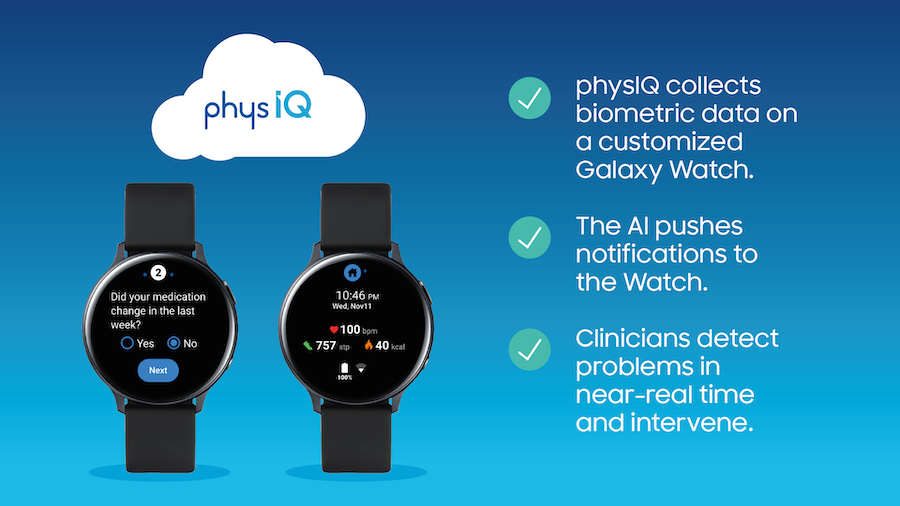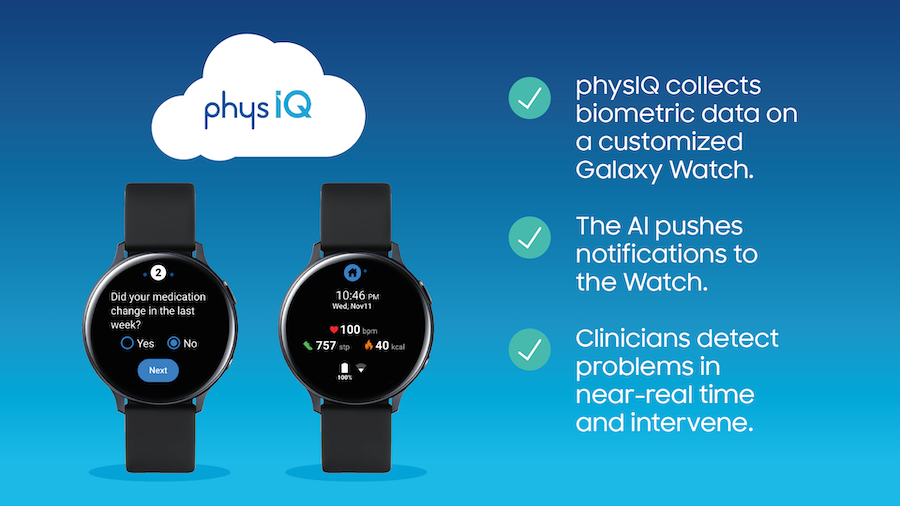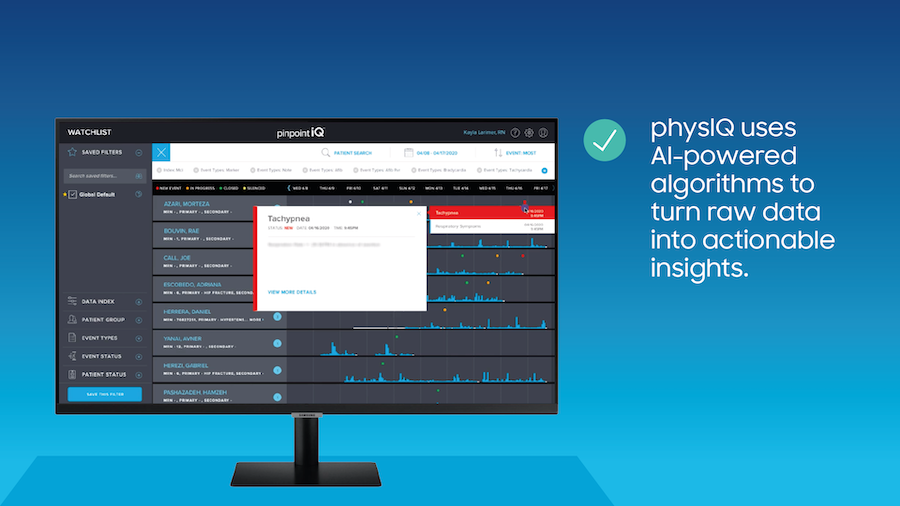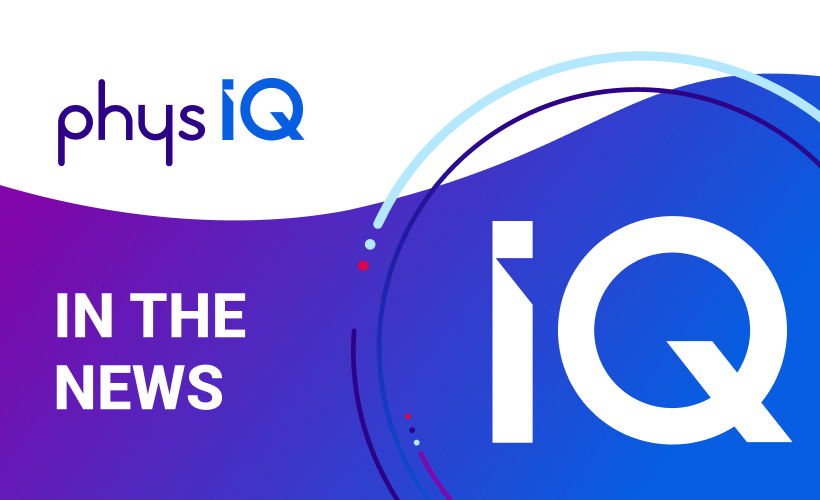Inside an Individual’s Physiological Signature
Originally published in Medical Device & Technology
5 min read
![]() physIQ
:
November 29, 2021
physIQ
:
November 29, 2021

Originally published in Samsung Insights
Clinical trials are critical to medical innovation, helping pharmaceutical companies prove that new treatments are both safe and effective. There are currently 392,193 active clinical studies worldwide, but many of these trials will be terminated before completion. Roughly 55 percent of terminated trials fail due to low participation.
To address this challenge, pharmaceutical companies are turning to physIQ‘s AI-based remote monitoring solution to generate new clinical insight and provide a better experience for patients participating in a clinical trial, thanks to the more convenient virtual study design.
“There’s a decentralization revolution happening in clinical trials where, rather than asking patients to go travel to the trial, they’re bringing the trial to the patient,” says Chris Economos, chief commercial officer at physIQ. “This idea exploded during COVID-19. Patients weren’t going into clinics unless they absolutely had to, and that put traditional clinical trial models at risk. But COVID aside, patients will only drive so far to get to a clinic, which really limits researchers geographically. By making it virtual, you remove those constraints.”
The virtual care model also allows for better data. Vital signs are collected via Samsung smartwatches or other wearable sensors, so researchers get a continuous data stream that provides greater insight into how a new treatment is affecting the patient.

How does the solution work? What are the benefits for pharmaceutical companies and clinical trial participants? And what’s next for this game-changing technology?
The physIQ origin story began more than 20 years ago, when co-founder Stephan Wegerich was working at Argonne National Laboratory, a Chicago-based institution focused on nuclear power. When a U.S.-based nuclear reactor came very close to a catastrophic event, the Department of Energy asked Argonne to create a solution that could predict future potentially catastrophic events.
“Stephan created a specialized analytical approach that applied machine learning to sensor data from the various components of a nuclear reactor. This approach learned how that reactor operates based on its own signature and then detects subtle anomalies or changes within those sensor streams,” Economos explains. This approach worked so well that a company was launched to commercialize the technology across industrial applications. That company, Smart Signal, revolutionized how complex industrial systems, like jet engines, were monitored to predict issues that might cause failure or down time. “It was essentially IoT [internet of things] before anyone knew what IoT was,” says Economos.
Fast forward to 2011, when the founding management team had a new use case in mind: healthcare. “They realized that wearable sensors were now going to be available at scale,” says Economos, “and if you could take the same approach to learn how a complex piece of machinery works based on its streaming data, then you should be able to do the same thing with human physiology using wearable sensor data.”
Over the next 10 years, physIQ developed and commercialized a medical-grade solution for collecting and analyzing continuous, real-time biosensor data.
The physIQ remote monitoring solution is comprised of two core assets: a portfolio of FDA-cleared analytics and digital biomarkers that transform raw data into clinical insights, and a massively scalable digital platform specifically designed for continuous biosensor data.
“Our solution is built around the idea of personalization, using an individual’s unique physiological data streams to determine what’s normal for them so we can detect meaningful changes in their physiology and extract actionable insights,” explains Economos.
The second asset is physIQ’s medical-grade digital platform, which collects and analyzes data from continuous biosensors. That data is streamed to the cloud, where AI-powered algorithms turn raw data streams into actionable insights for researchers and clinicians.

To collect this data, physIQ uses a variety of mobile devices. For some studies, patients use Bluetooth-enabled wearable sensors to collect the data, which is streamed to a Samsung Galaxy smartphone and then to the cloud. “We use the Samsung phone as a data hub and patient engagement tool,” Economos explains. “The phone also collects subjective responses from patients about how they’re feeling or functioning.”
Alternatively, the physIQ solution can be deployed on a customized Samsung Galaxy Watch, set up with the physIQ app to collect biometric data from sensors in the smartwatch.
“The watch-based solution is a closed-loop system, so physiological vital sign data streams directly from the watch to the cloud,” says Economos. “Our analytics process that data, and if the AI detects something noteworthy, it can push a specific question to the patient on the watch. This puts us in an amazing position of being able to simultaneously collect physiological data and symptomatic data. So, we’re not just understanding what the patient’s heart rate or blood pressure is at a certain time, but also how they’re feeling at that time.”
Working closely with researchers and clinicians, physIQ can determine the best mobile device and Bluetooth biometric devices for each use case. Using Samsung Knox configuration tools, physIQ puts the smartphones and watches into kiosk mode so they’re locked down for clinical single-purpose use. Then physIQ kits the mobile devices with the appropriate Bluetooth accessories and ships them directly to the patient or clinical site.
“Samsung’s customization tools let us control what’s available on the watch, which makes it uniquely suitable for clinical trials,” says Economos. “We lock down the device so the patient can’t change any settings that might interrupt data collection or download anything that might drain the battery. This ability to take over the device and make it work in a clinical environment makes our solution unique and extremely powerful.”
There are many remote patient monitoring (RPM) solutions on the market, but Economos says “the combined Samsung plus physIQ solution is truly one of a kind in terms of supporting pharmaceutical use cases.” How does it improve the clinical trial experience, for pharmaceutical companies and study participants?
1. Access to raw data
In addition to AI-enhanced insights about biosensor data, physIQ also provides researchers with access to all raw data streams — which isn’t possible in other smartwatch operating systems.
“Samsung devices let us collect the raw data, which is really important in clinical studies,” says Economos. “Data scientists want the raw data, and there’s no other consumer device at scale that provides it.”
2. Real-time, continuous data streams
No other remote monitoring platform allows for near-real-time data collection and processing. With physIQ, researchers and clinicians learn about problems as they arise and can intervene immediately. And because data is streamed continuously, researchers have far greater insight into how experimental treatments affect patients.
“A one-minute pulse or spot blood pressure check in a doctor’s office doesn’t offer much insight” says Economos. “We’re collecting every heartbeat, every breath, 24 hours a day for months on end, so we’re able to build an unbelievably rich and comprehensive picture of the patient’s health.”
3. Patient engagement
Virtual trials are more convenient and provide greater peace of mind for patients, who know an FDA-cleared solution is monitoring their data to ensure their safety. And with physIQ’s solution, they gain a better understanding of their own health.
“In general, there’s a push in clinical trials to make data available to patients,” explains Economos. “We provide this whole new dimension of visibility into one’s own health and physiology, which drives patient engagement.”
4. Scalability
Clinical trials involve anywhere from 20 to 3,000 people, so a virtual care solution needs to be easy to deploy at scale. Samsung makes this part easy for physIQ.
“Pharma companies want to know that anything they deploy is robust,” says Economos, “and they know Samsung can do things at scale. We’re deploying these things around the world, and uptime is critical. Samsung’s mobile management technology lets us address potential problems quickly and at scale.”
The list of use cases for RPM is ever evolving. Even before COVID-19, hospitals were investing in the technology for post-acute care, and a growing number of physicians offices were using it for chronic disease management. During the pandemic, the demand skyrocketed overnight, and many new RPM vendors entered the market. But physIQ has something they don’t — decades of experience developing machine-learning algorithms and predictive analytics.
Continuous data streams and meaningful, personalized insights make physIQ a valuable remote monitoring solution for healthcare providers. For example, hospitals are using it to care for COVID-19 patients who don’t need to be hospitalized but are at high risk of developing complications. Meanwhile, Purdue University is testing a physIQ solution that could help detect early COVID symptoms.
Pharmaceutical companies are also leveraging physIQ to improve patient engagement and health outcomes beyond clinical trials.
“Pharmaceutical companies see the opportunity to not just provide a traditional pharmacotherapy but also a digital component to help solve the underlying clinical problem — for example, tools that support patient adherence or predictive analytics to detect when there might be an issue a patient should talk to their doctor about,” says Economos. “We’re just scratching the surface of how we can help pharmaceutical companies improve the patient experience, and it’s uniquely enabled by our relationship with Samsung.”
Discover solutions and best practices that transform the remote patient experience and improve health outcomes. And discover Samsung’s full lineup of mobile solutions for healthcare, designed with hospital and clinical operations in mind.

Originally published in Medical Device & Technology

Originally published in Pixel Scientia Labs

Originally published in Crain's Chicago